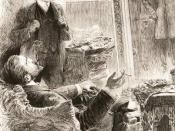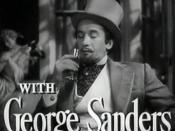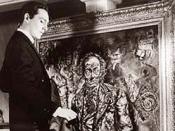The Picture of Dorian Gray is yet another novel portraying evil and being blasphemous. The theme is very much reflected by the book's setting, plot structure and
characterization. It shows how individuals can slowly deteriorate because of
the evil lying within themselves. The power of greed, selfishness and the will to gain immortality take over Dorian Gray and create an ugly evil side to him.
Corruption caused by art, scandalous homoerotic bonds, and even the Anti-Christ himself have been said to be figured in Oscar Wilde's The Picture of Dorian Gray. Critics have ranted and raved about the novel's supposed advocacy of seeking out the sensual and often taboo pleasures of life and denying the senses of nothing. They've praised and condemned Wilde's ambiguous representation of the homosexual triad formed by the three central characters, Dorian Gray, Basil Hallward, and Lord Henry Wotton. Dorian's abuse of experience and his preference of illusion to reality have been explored in depth.
One critic even claimed the novel's antagonist Lord Henry Wotton to be a representation of the Devil (Spivey. 1980: 501). While many literary critiques discuss the implications of the themes laid out by Wilde, few have sought to determine the implications of the mood and the stylistic approach taken in the creation of the novel.
The relationships between the male characters of The Picture of Dorian Gray have been the main subject of discussion in many literary critiques. While the homosexual nature of Dorian, Basil, and Harry are undeniably apparent, the message Wilde is emphasizing through his vague depiction of homosexuality in the characters is debatable. Critic Jeffery Meyers claimed that the underlying assumption behind this depiction is the fear, guilt, and self-hatred which accompany homosexual pleasure. Wilde demonstrates these emotions through Dorian's endeavors to suppress his homosexuality by means...


